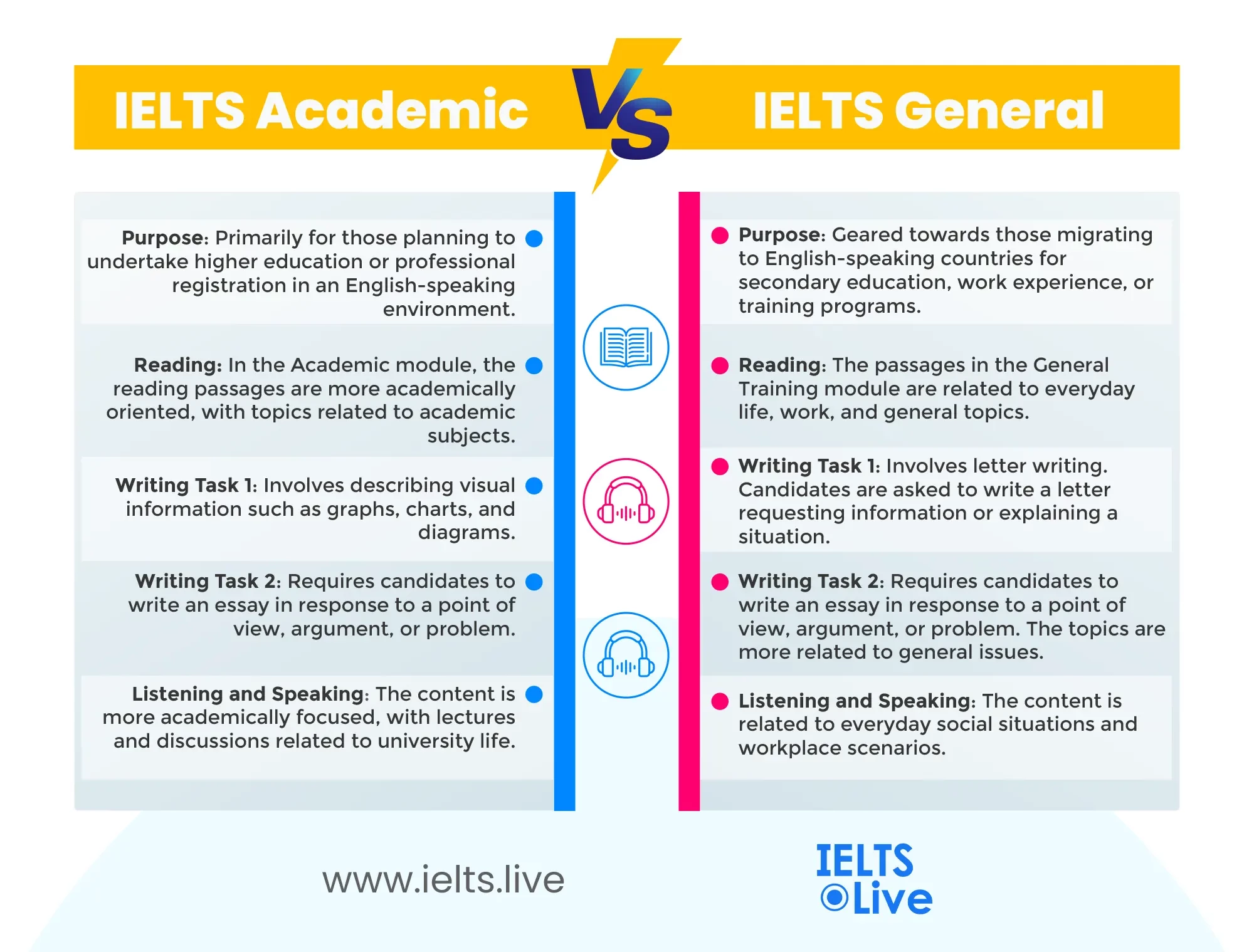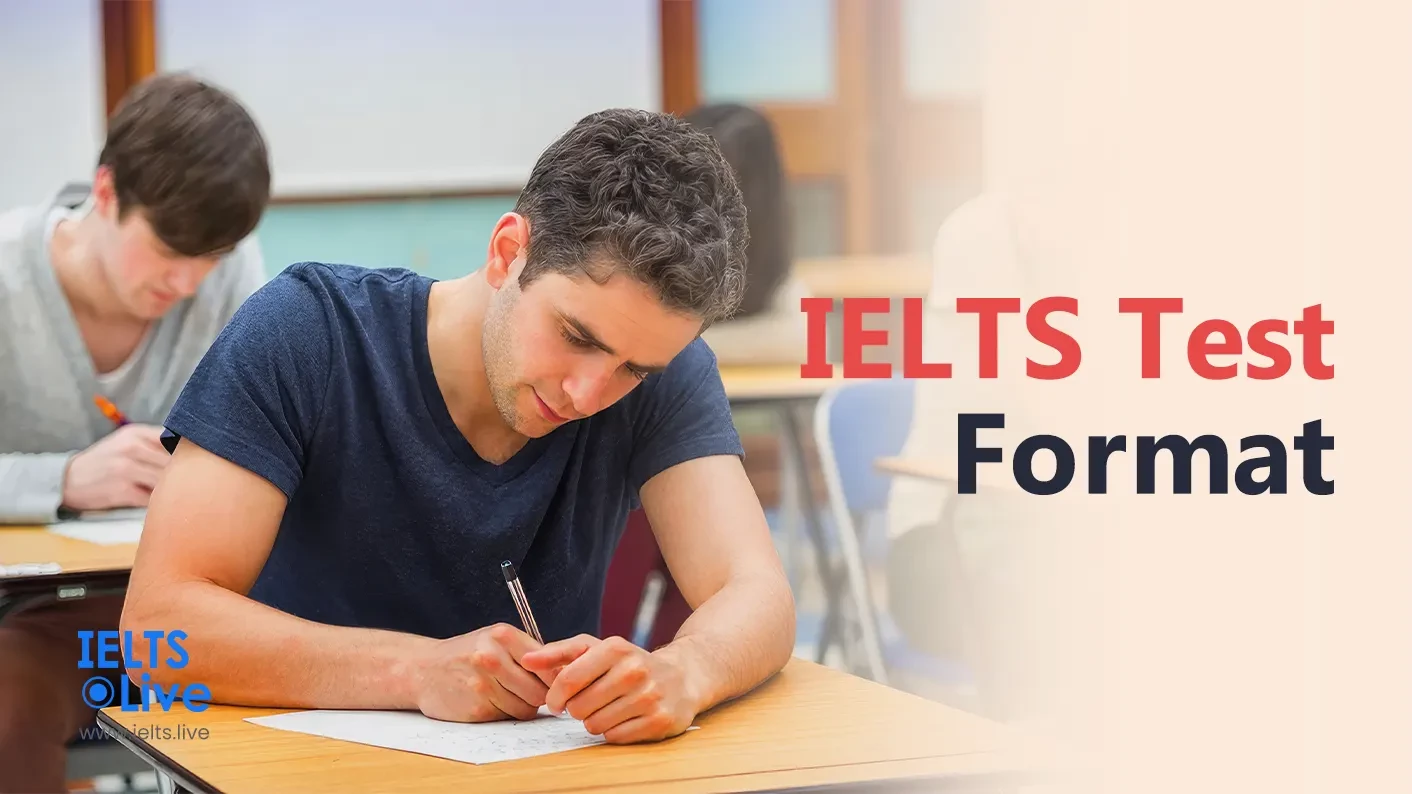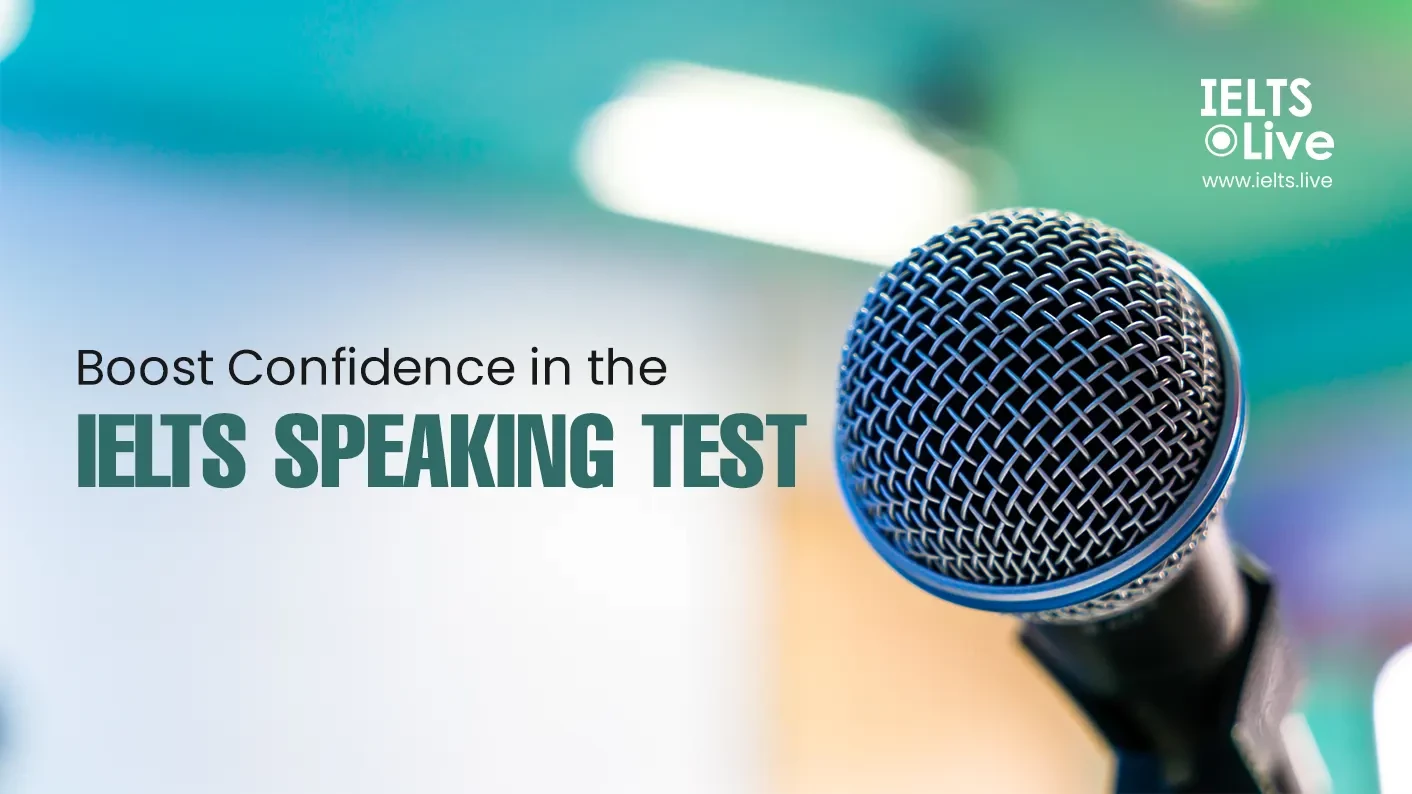
Are you struggling to decide between the Academic and General Training IELTS modules for your English language test? We understand how difficult and puzzling this decision is to make.
In this blog, we'll help you choose a module that fits your objectives and desires. You will obtain the clarity necessary to confidently start your IELTS journey by understanding the differences, scoring criteria, and parallels between these modules. Let's look at the path to your success together.
You may also like: The Secret To Acing The IELTS Test Format - Revealed!
What Separates IELTS Academic and General Training?
Knowing the key distinctions between IELTS Academic and General Training will help you select the module that best meets your needs. To assist you in making a wise choice, let's examine the characteristics that distinguish these modules.
Purpose and Target Audience:
The first difference is found in each module's goal and type of audience. Students who intend to pursue higher education or apply for professional registration in an English-speaking nation should take the IELTS Academic exam. General Training, on the other hand, is primarily designed for people who want to move to an English-speaking nation or pursue non-academic training.
The academic module focuses on evaluating your capacity for comprehension and communication in an academic setting, which is essential for success in higher education or the workplace. However, the focus of the general training module is on the useful language abilities needed for social interactions, jobs, and everyday life.
Reading and Writing Components:
IELTS Academic and General Training modules' reading and writing components vary significantly as well.
The reading section in the academic module includes challenging texts, academic vocabulary, and calls for critical analysis. You can anticipate reading passages that touch on a variety of subjects, including science, the humanities, or the social sciences. This test's objective is to gauge your comprehension of and capacity for information extraction from challenging academic texts.
The reading portion of the General Training module, in contrast, concentrates on commonplace texts like advertisements, notices, or job descriptions. The passages are made to test your comprehension abilities in everyday, non-academic situations like comprehending directions, locating precise information, or interpreting meaning.
The writing tasks in the Academic module require you to present arguments, analyse data, and use a formal tone. Writing essays or reports on academic subjects may be required of you as a means of demonstrating your logical thinking and command of academic language.
The writing assignments in the General Training module are based on real-world situations like writing letters, expressing opinions, or reacting to a predicament. These exercises test your capacity for effective semi-formal communication in casual settings.
Listening and Speaking Components:
There are some similarities between the listening and speaking parts of both modules, which can be a relief for test-takers.
Both modules share the same listening element. It evaluates your capacity to comprehend spoken English in a variety of settings, such as in conversations, presentations, or academic lectures. You will hear a variety of accents that reflect real-life situations, and you will be asked to provide answers to questions based on what you hear.
The speaking portion is also the same for both modules. It involves a face-to-face interview with an examiner and measures how well you can articulate your ideas, opinions, and experiences. Your pronunciation, vocabulary, grammar, and overall oral communication abilities will be evaluated by the examiner.
Now that you are aware of these major differences, you can assess your objectives, aspirations, and needs in order to select the module that best suits them. Choosing the appropriate module will put you on the road to success, whether your goals are non-academic training, migration, professional registration, or higher education.
In the following section, we will go over the scoring criteria for the IELTS Academic and General Training modules, so you can see how your performance will be graded.
Scoring Criteria: Understanding the Grading System
After choosing between taking the IELTS Academic or General Training module, it is important to understand the scoring requirements. This information will help you set reasonable goals for your desired score and give you insight into how your performance will be evaluated. Let's analyse how both modules will be graded.
Academic Module Scoring:
Each of the four sections of the IELTS Academic module—Listening, Reading, Writing, and Speaking—is graded on a nine-band scale. Your overall band score is calculated by averaging the individual scores from each section.
The specific assessment criteria are outlined in the band descriptors. The language skills that these descriptors highlight include vocabulary, coherence and cohesion, task response, and grammatical accuracy. Your performance in each of these categories will improve as your band score rises.
For instance, a band score of 7 in the Writing section denotes effective vocabulary and grammar use along with a good command of the language. A band score of 5, on the other hand, denotes a less consistent command of the language, along with some inaccuracies and sparse vocabulary use.
In the Academic module, a high overall band score is crucial, especially if you want to be considered for professional registration or admission to prestigious universities. Your band score reflects your capacity to understand challenging academic texts, analyse data, and communicate clearly and fluently.
General Training Module Scoring:
The General Training module's scoring requirements are similar to those for the Academic module. However, the band descriptors do differ in a few ways to reflect the module's unique context and purpose.
The band descriptors in the General Training module emphasise the use of language in real-world situations and outside of the classroom. In the Writing section, for instance, a band score of 7 denotes a superb command of the language for general purposes, while a band score of 5 denotes a modest ability to communicate in everyday situations.
It is crucial to keep in mind that passing the General Training module with a particular overall band score is necessary to fulfil the requirements for immigration or career training. Thus, carefully consider the band score you require to achieve your specific objectives and plan your preparation in accordance.
Assessing your strengths and weaknesses in language skills will be easier for you if you are aware of the scoring criteria for both modules. You can effectively focus your preparation efforts and increase your chances of getting your desired band score by determining which areas still need work.
We will examine the similarities between the IELTS Academic and General Training modules in the following section. This knowledge will help you make an informed decision and prepare for the test with a thorough understanding of its structure and requirements.

Similarities between IELTS Academic and General Training
There are several significant similarities between the IELTS Academic and General Training modules despite the fact that they serve different objectives and cater to different audiences. Knowing these similarities can give you a sense of familiarity and aid in your test preparation. Let's explore the elements that the Academic and General Training IELTS modules have in common.
Listening and Speaking Components:
The listening section is the same in both the Academic and General Training IELTS modules. Y ou will hear a variety of accents, including British, American, Australian, and others, regardless of the module you select. This reflects the variety of English-speaking settings you might come across in actual life.
The listening test also evaluates your capacity to comprehend spoken English in a variety of settings, including dialogue, monologues, and academic lectures. To properly assess your comprehension abilities, a variety of question types—including multiple-choice, matching, and short answer—will be given to you.
Speaking Component: Both modules share the same speaking section. It involves a face-to-face interview with an examiner who evaluates your English communication skills. During the speaking test, your fluency, coherence, vocabulary use, grammar correctness, and pronunciation will be assessed.
You will be questioned about your personal experiences, opinions, and a particular subject during the interview. You will converse with the examiner during the exam, giving you the chance to speak freely about your ideas, experiences, and thoughts. Your ability to engage in confident, coherent spoken communication is evaluated by this component.
Test Format and Duration:
Test Format: IELTS Academic and General Training modules both have the same test format. Regardless of the module you select, the sections—Listening, Reading, Writing, and Speaking—remain in the same order. This standardised format enables you to become accustomed to the order of tasks and create a study schedule accordingly.
Test Duration: The overall test length is roughly equal for the two modules. Without breaks, the test will last about 2 hours and 45 minutes. To finish all tasks within the allotted time, each section has a set time limit, so it's critical to manage your time wisely.
As you begin your IELTS journey, prepare thoroughly and concentrate on improving your language skills in areas associated with your chosen module. Use available resources, practise sample tests, and get assistance if necessary. With good preparation and a clear grasp of the test requirements, you can confidently approach the IELTS exam and strive for the perfect band score.
Best wishes for your IELTS preparation and the wonderful possibilities that await you on your route to success!








0 COMMENTS